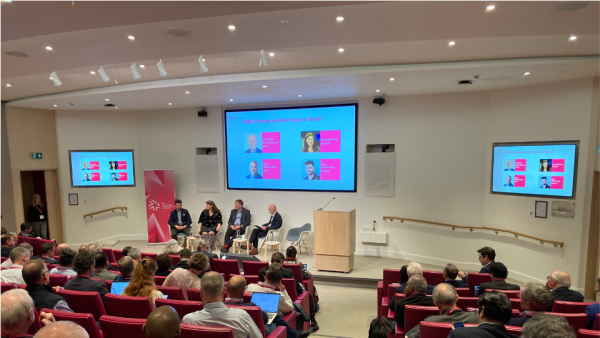
A series of Future Capability Papers, authored by the UKTIN Expert Working Groups, are being published over the coming months. Find out more here.
UKTIN spoke to Andy Sellars and Rupert Baines, Co-Chairs of the UKTIN Semiconductor Expert Working Group, to learn more about the group’s paper.
Please talk us through the process of creating the paper.
Sellars: Although the Semiconductor Expert Working Group (EWG) only formed towards the end of the year, the members mobilised quickly to produce an initial draft within a relatively short time. We were fortunate to have a diverse group of EWG members with broad experience and expertise from academia and industry.
Baines: We started with 25 or so people in the group, a mix of industry, academia, big companies and small companies, including not-for-profit and industry organisations. We have included a very broad perspective.
What is the one thing you’d like people to know about the report?
Sellars: At the outset, the EWG highlighted the interdependence between four of the five critical technologies in the previous UK Government’s Science and Technology Framework, namely: artificial intelligence; future telecoms; quantum technologies and semiconductors. The EWG recommended the formation of a National Semiconductor Institute to coordinate these activities. It was gratifying to see the National Semiconductor Institute announced on 20 May, and it will be interesting to see the direction of travel as the new Government settles in.
Baines: We think this is a very solid piece of work that discusses the state of the semiconductor industry within telecoms, with a particular focus on the issues. However, the paper also goes broader and discusses the semiconductor industry as a whole. We decided on 13 recommendations: there was a very strong consensus between us.
What surprised you most while preparing this report?
Sellars: I was surprised by how quickly the EWG coalesced around common themes, reflecting a shared experience from the sector. It was clear the EWG were passionate about making a difference in UK telecoms.
Baines: The degree of consensus amongst the EWG groups as a whole. We shared our first recommendations and thoughts about the same time as the IFM study came out and though we had spoken, we hadn’t engaged in any formal coordination, so it was very positive to see how aligned we were. We also recently had a cross-EWG meeting and everybody was very much on the same page.
What conclusions were you able to draw from the paper?
Sellars: The conclusions were grouped within three themes: skills, scale-up and supply chain. There was unanimous agreement within the EWG that addressing the recommendations within these themes was the most effective way to support the UK telecoms sector.
Baines: We concluded that there needed to be a body to champion work and a couple of weeks ago, The National Semiconductor Institute was announced, something we very much welcome.
Are there any themes picked up in this paper that we can expect to see continued or explored in the other EWG papers?
Sellars: Some themes from the semiconductor paper are certainly reflected in papers produced by the other EWGs. In fact, the semiconductor paper was reviewed by the other EWGs to capture areas of commonality. It was interesting and positive to see that the issues, and recommendations, were consistent across the expert working groups. For example, the need for long-term investment in skills was universally recognised along with the need for secure supply chains. More specifically, the role of silicon photonics in future telecom networks was identified as a UK strength.
Baines: There was a lot of consistency, especially with photonics and optics, which align very strongly with semiconductors, particularly the kind that the UK is good at. Going forward, the groups may work together more formally.









